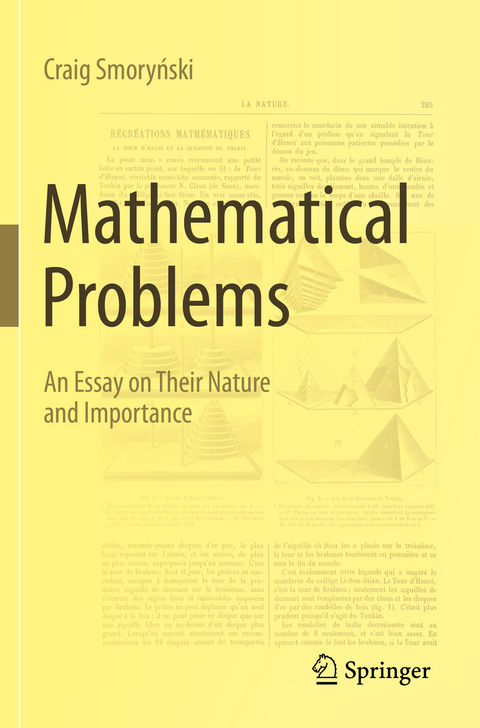
Mathematical Problems
Springer International Publishing (Verlag)
978-3-030-50919-4 (ISBN)
The literature abounds with books dedicated to mathematical problems - collections of problems, hints on how to solve them, and even histories of the paths to the solutions of some famous ones. The present book, aimed at the proverbial "bright high-school student", takes a different, more philosophical approach, first dividing mathematical problems into three broad classes - puzzles, exercises, and open problems - and discussing their various roles in one's mathematical education. Various chapters are devoted to discussing examples of each type of problem, along with their solutions and some of the developments arising from them. For the truly dedicated reader, more involved material is offered in an appendix.
Mathematics does not exist in a vacuum, whence the author peppers the material with frequent extra-mathematical cultural references. The mathematics itself is elementary, for the most part pre-calculus. The few references to the calculus use the integral notation which the reader need not truly be familiar with, opting to read the integral sign as strange notation for area or as operationally defined by the appropriate buttons on his or her graphing calculator. Nothing further is required.
Advance praise for Mathematical Problems
"There are many books on mathematical problems, but Smorynski's compelling book offers something unique. Firstly, it includes a fruitful classification and analysis of the nature of mathematical problems. Secondly, and perhaps most importantly, it leads the reader from clear and often amusing accounts of traditional problems to the serious mathematics that grew out of some of them." - John Baldwin, University of Illinois at Chicago
"Smorynski manages to discuss the famous puzzles from the past and the new items in various modern theories with the same elegance and personality. He presents and solves puzzles and traditional topics with a laudable sense of humor. Readers of all ages and training will find the book a rich treasure chest." - Dirk van Dalen, Universiteit Utrecht
Craig Smorynski got his PhD at the University of Illinois at Chicago Circle with a dissertation on Kripke models for intuitionistic systems. This served as good background when he got involved in the birth and early development of provability logic, publishing the first mathematical textbook on the subject (Self-Reference and Modal Logic, Springer, 1985). He has written a number of books on mathematics and its history, most notably Logical Number Theory (Springer, 1991), Adventures in Formalism (College Publications, 2012), and MVT: A Most Valuable Theorem (Springer, 2017). In addition, he has contributed chapters to the Handbook of Mathematical Logic and the Handbook of Philosophical Logic.
1 Introduction.- 2 Logic Puzzles.- 3 Some Basic Mathematical Exercises.- 4 Probability.- 5 Graph Theory.- A Further Explorations.- Index.
"The author discusses, with illustrative quotes, problems with a long history that contributed to the development of mathematical areas. ... provides exercises and investigations for the reader." (E. J. Barbeau, Mathematical Reviews, February, 2022)
“The author discusses, with illustrative quotes, problems with a long history that contributed to the development of mathematical areas. … provides exercises and investigations for the reader.” (E. J. Barbeau, Mathematical Reviews, February, 2022)
| Erscheinungsdatum | 22.09.2020 |
|---|---|
| Zusatzinfo | VI, 406 p. |
| Verlagsort | Cham |
| Sprache | englisch |
| Maße | 155 x 235 mm |
| Gewicht | 624 g |
| Themenwelt | Geisteswissenschaften ► Philosophie ► Logik |
| Mathematik / Informatik ► Mathematik ► Graphentheorie | |
| Schlagworte | Fibonacci numbers • graph theory • Logic • mathematical problems • mathematical research • Probability • Puzzles • Tower of Hanoi |
| ISBN-10 | 3-030-50919-2 / 3030509192 |
| ISBN-13 | 978-3-030-50919-4 / 9783030509194 |
| Zustand | Neuware |
| Haben Sie eine Frage zum Produkt? |
aus dem Bereich


